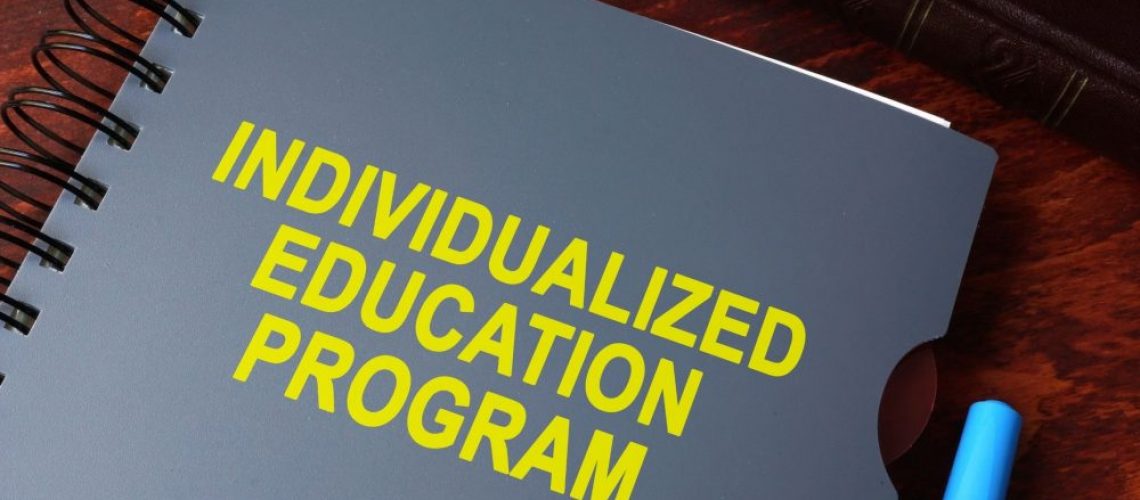An Individualized Education Plan, or IEP, provides an educational roadmap for children with learning disabilities. IEPs allow parents, teachers, and school staff to work together to help students succeed. All public school students who receive special education services are legally required to have an IEP in place. As noted by the United States Department of Education, an IEP is more than just a helpful document. Rather, it is “…the cornerstone of a quality education for each child with a disability.”
What’s Included in an IEP?
Individualized attention is the key to an IEP’s success. There is no one-size-fits-all IEP that applies to multiple children. Rather, the process is highly individual and based entirely on the specific child’s needs. Each IEP must contain specific information about the child to provide educational guidance. The USDE lists the following information and questions each IEP must answer:
- Current Performance: How is the child currently doing in school?
- Yearly Goals: What are the child’s goals for this school year?
- Special Education Services: What services does the child need to meet his or her goals?
- Participation With Other Students: To what extent will the child be removed from non-disabled students to meet their goals?
- Testing: What kind of accommodations will the child need to meet state testing requirements?
- Where and When: What date and place will the IEP be enforced, and for how long?
- Transition Factors: How will the IEP prepare the student to meet their needs when schooling is complete?
- Age-Related Rights: If applicable, does the IEP include a statement indicating that the student has been informed of their rights after reaching the age of majority (usually between the ages of 18 and 21)?
- Progress Measurement: How will the school measure the child’s progress and inform parents of his or her progress?
Why Should My Child Get an IEP?
If your child attends a public school and has a learning disability, working through obtaining an IEP is worth it. Although some people think IEPs are only for children with learning disorders like dyslexia, autism, ADHD, speech, vision, hearing, or language impairment, IEPs are also beneficial for children with behavioral and emotional challenges, since they offer services like counseling or psychological services. If your child has any of these conditions, an IEP will help them not only get by but even thrive in the school setting.
The primary reason an IEP might be a good fit is that it can improve your child’s confidence and level of happiness level at school. The accommodations and services provided by an IEP will him or her feel more confident in academic and social life. For example, your child might be able to receive speech-language therapy, physical therapy, counseling services, transportation, longer time, or different formats for test-taking, or shortened assignments with less writing than other students. These helpful accommodations will go a long way in allowing your student to reach their fullest potential without feeling overwhelmed and far behind their peers.
An IEP also provides legal protection for parents of children with learning disabilities. Since an IEP is technically a legal document, public schools are required to submit documentation and proof that they are following any IEP plans every two years. This ensures that the accommodations your child needs are being respected and followed by the school district and reassures parents that their child’s plan will be followed.
Finally, an IEP will help your child adjust to life beyond school. When properly designed and executed, an IEP includes transition services that help students prepare for adult life. For example, an IEP might include career planning services or help the student become more involved in community life.
My school is not answering my needs. I need help with my IEP!
While the law provides for an IEP in all public schools, the implementation and management of the IEP and your child are handled by the local school and school district. Unfortunately, this is not always efficient and can be complicated to be certain the school provides all timely services and evaluations for your child. Help from an IEP advocate can be beneficial. You can search for these advocates under services needed: IEP Planning, Assistance, and Counseling. These experts can be a huge resource for you! Don’t be afraid to ask for help and guidance.
What About Homeschoolers and Private School Students?
IEPs are governed by the U.S. Department of Education’s Individual With Disabilities Education Act, or IDEA. For this reason, IEPs are free services used in public schools. Private schools do not receive the funding public schools do and are not required by law to provide IEPs for students with learning disabilities. However, many private schools still choose to provide special services similar to an IEP, so check with the school administration to determine whether or not a given private school would provide services and accommodations for your child.
Homeschoolers also need to check their state and school district requirements to determine whether an IEP is an option. Although some states do not allow homeschoolers to use an IEP, there may be other ways to ensure your child receives the services they need to succeed in school. Be sure to check out Anything Academic’s State Law Library for all of your state’s requirements.
Although the process can be time-consuming, developing an IEP for your child could be the difference between a happy, successful school experience and a miserable one. In the end, most parents find the accommodations, services, and legal protection provided by an IEP are well worth the time.

